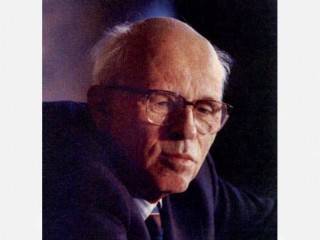
Sakharov, Andrei biography
Date of birth : 1921-05-21
Date of death : 1989-12-14
Birthplace : Moscow, Russia
Nationality : Russian
Category : Science and Technology
Last modified : 2010-04-22
Credited as : Russian nuclear physicist, Father of the Atomic bomb, Nobel Peace Prize
0 votes so far
Although he helped design the atomic bomb and was considered the key scientist in the development of the hydrogen bomb, Andrei Sakharov later become known as a political activist who worked endlessly to promote political and intellectual freedom. He believed strongly in a system where anyone could access information upon his or her own will, gather facts and opinions, and speak to others about them to prevent the downfall of modern society by those who control the masses to become malevolent dictators.
Educated in Moscow at the State University in 1938, he had to continue his studies in Turkmenistan due to the Great Patriotic War that took place in 1941. In 1945, he was able to return to Moscow where he studied under the Soviet Academy of Sciences. In 1947, he obtained his Ph.D.
With an interest in cosmology, especially the energy possessed by cosmic rays, Sakharov never got to pursue the field because of his increased involvement in the development of the Soviet’s atomic bomb program. Upon the development of the atomic weapon, he was instrumental in increasing the power of the hydrogen bomb using what was called the Sloika design. He then furthered his endeavors by helping create the first megaton-range Soviet Hydrogen Bomb, which would become the biggest, most powerful bomb ever devised.
After a few years, he then went to work on nuclear fusion reactors that could be used for mass energy production. However, after Andrei Sakharov saw what his work was being used for – namely the arms race against the U.S. and an increase in atomic bomb production – he thought over the issue and turned his scientific endeavors into ones that incorporated ideas for the betterment of society as a whole, especially those with regard to human rights.
In 1968, without the go ahead from government superiors, Sakharov published essays in regard to the nuclear race and how if not halted or controlled would lead to a major nuclear war and the eventual fallout for all mankind. It was after these essays were published outside of the USSR that Andrei was banned from further military scientific pursuits. He went back to Moscow and formed the Moscow Human Rights Committee, which was watched very closely by the communist regime.
It wasn’t until 1975 that he won the Nobel Peace Prize for his work, but was not allowed to leave the Soviet Union to formally address the committee. So, his wife went to the awards ceremony on his behalf. In the memoir of Andrei Sakharov, he talks about how he was kept under police watch and basic house arrest for years on end. In 1989, with the rise of Mikhail Gorbachev, he was invited back to Moscow and became a member of parliament.
















